Text
surviving the current age of internet means saying no to subscriptions and premiums for basic features. you must endure the inconvenience of not being able to use every server emoji in discord. you must build the patience to find alternatives like NewPipe so you can listen to music on youtube while your phone screen sleeps. do Not give these corporations your limited disposable income. tiktok not letting me view videos on my phone without downloading the app? i will outlast tiktok and the execs will be remembered as dull,disgusting capitalists. listen to me, listen to me. if you do not know how to pirate shows from hulu, learn. if you can't pirate it, it is not worth the money to rent it. please i'm on my hands and knees. do not accept this form of internet.
50K notes
·
View notes
Text
Workbooks to improve executive functioning
Since the post I made last night about improving executive functioning was so popular, I figured I should pull these out of my comments and give them their own post, in case it's helpful for people.
I have worked with the publishers of all of the books linked below and can vouch for their psychology books. The publisher of most of them, New Harbinger, is an extremely credible evidence-based psychology publisher.
Obvious disclaimer that everyone's brain is different and what works for someone else may not work for you.
Is there evidence that executive functioning can be improved? Yes. This book appears to be a very thorough overview of the field, and contains both advocates and detractors of cognitive training, for a balanced perspective. From the table of contents, I would really recommend jumping straight to Part 3: Developmental Perspectives for executive functioning (EF) writ large.
Certain therapy modalities are specifically designed for skill-building in areas like impulsivity, decision-making, emotional regulation, and cognitive flexibility, all of which are EF skills or very dependent on EF skills. Dialectical Behavior Therapy (DBT) is probably the best field to look at for these - skill-building in those areas is its core goal.
Some DBT workbooks:
The Dialectical Behavior Therapy Skills Workbook: Practical DBT Exercises for Learning Mindfulness, Interpersonal Effectiveness, Emotion Regulation, and Distress Tolerance
The Dialectical Behavior Therapy Skills Workbook for Teens
There are also a lot of workbooks for ADHD that are sometimes more broad but also can help with executive functioning:
The Adult ADHD and Anxiety Workbook: Cognitive Behavioral Therapy Skills to Manage Stress, Find Focus, and Reclaim Your Life
The CBT Workbook for Adult ADHD: Evidence-Based Exercises to Improve Your Focus, Productivity, and Wellbeing
The Neurodivergence Skills Workbook for Autism and ADHD
General executive functioning workbooks:
The Executive Functioning Workbook for Teens
Executive Functioning Workbook for Adults: Exercises to Help You Get Organized, Stay Focused, and Achieve Your Goals
Hope these are helpful to someone!!
5K notes
·
View notes
Text
30K notes
·
View notes
Text
I feel like witches are sedentary and wizards are migratory. A witch has a home, a cauldron, herbs, you go to them with your problem. A wizard wanders, disappears, shows up at inconvenient times to fix nothing. am i making sense
90K notes
·
View notes
Text
Gandalf, taking a hit from his joint: Did you guys know that mithril is super expensive? Like insanely valuable? That it’s very much a finite resource mostly plundered from the earth and invaluable due to its many uses? And also Sauron has most of it so it’s now lost to its Elven and Dwarvish makers? And to think Bilbo’s precious gift of mithril mail is probably sitting in the local Useless Dumb Artefacts Museum. Just makes you think lol ...
Gimli, a dwarf who has lost most of his people’s cultural artefacts: ... I’m sorry Bilbo was given what and did what with it
Frodo, secretly wearing Bilbo’s mithril mail at that very moment but only after nearly 70 years of it sitting in the Useless Dumb Artefacts Museum gathering dust because Bilbo had no idea his cool shirt was worth approximately the net value of their entire country:

124K notes
·
View notes
Text
How to Make Your Writing Less Stiff Part 3
Crazy how one impulsive post has quickly outshined every other post I have made on this blog. Anyway here’s more to consider. Once again, I am recirculating tried-and-true writing advice that shouldn’t have to compromise your author voice and isn’t always applicable when the narrative demands otherwise.
Part 1
Part 2
1. Eliminating to-be verbs (passive voice)
Am/is/are/was/were are another type of filler that doesn’t add anything to your sentences.
There were fireworks in the sky tonight. /// Fireworks glittered in the sky tonight.
My cat was chirping at the lights on the ceiling. /// My cat chirped at the lights on the ceiling.
She was standing /// She stood
He was running /// He ran
Also applicable in present tense, of which I’ve been stuck writing lately.
There are two fish-net goals on either end of the improvised field. /// Two fish-net goals mark either end of the improvised field.
For once, it’s a cloudless night. /// For once, the stars shine clear.
Sometimes the sentence needs a little finagling to remove the bad verb and sometimes you can let a couple remain if it sounds better with the cadence or syntax. Generally, they’re not necessary and you won’t realize how strange it looks until you go back and delete them (it also helps shave off your word count).
Sometimes the to-be verb is necessary. You're writing in past-tense and must convey that.
He was running out of time does not have the same meaning as He ran out of time, and are not interchangeable. You'd have to change the entire sentence to something probably a lot wordier to escape the 'was'. To-be verbs are not the end of the world.
2. Putting character descriptors in the wrong place
I made a post already about motivated exposition, specifically about character descriptions and the mirror trope, saying character details in the wrong place can look odd and screw with the flow of the paragraph, especially if you throw in too many.
She ties her long, curly, brown tresses up in a messy bun. /// She ties her curls up in a messy brown bun. (bonus alliteration too)
Generally, I see this most often with hair, a terrible rule of threes. Eyes less so, but eyes have their own issue. Eye color gets repeated at an exhausting frequency. Whatever you have in your manuscript, you could probably delete 30-40% of the reminders that the love interest has baby blues and readers would be happy, especially if you use the same metaphor over and over again, like gemstones.
He rolled his bright, emerald eyes. /// He rolled his eyes, a vibrant green in the lamplight.
To me, one reads like you want to get the character description out as fast as possible, so the hand of the author comes in to wave and stop the story to give you the details. Fixing it, my way or another way, stands out less as exposition, which is what character descriptions boil down to—something the audience needs to know to appreciate and/or understand the story.
3. Lacking flow between sentences
Much like sentences that are all about the same length with little variety in syntax, sentences that follow each other like a grocery list or instruction manual instead of a proper narrative are difficult to find gripping.
Jack gets out a stock pot from the cupboard. He fills it with the tap and sets it on the stove. Then, he grabs russet potatoes and butter from the fridge. He leaves the butter out to soften, and sets the pot to boil. He then adds salt to the water.
From the cupboard, Jack drags a hefty stockpot. He fills it with the tap, adds salt to taste, and sets it on the stove.
Russet potatoes or yukon gold? Jack drums his fingers on the fridge door in thought. Russet—that’s what the recipe calls for. He tosses the bag on the counter and the butter beside it to soften.
This is just one version of a possible edit to the first paragraph, not the end-all, be-all perfect reconstruction. It’s not just about having transitions, like ‘then’, it’s about how one sentence flows into the next, and you can accomplish better flow in many different ways.
4. Getting too specific with movement.
I don’t see this super often, but when it happens, it tends to be pretty bad. I think it happens because writers feel the need to overcompensate and over-clarify on what’s happening. Remember: The more specific you get, the more your readers are going to wonder what’s so important about these details. This is fiction, so every detail matters.
A ridiculous example:
Jack walks over to his closet. He kneels down at the shoe rack and tugs his running shoes free. He walks back to his desk chair, sits down, and ties the laces.
Unless tying his shoes is a monumental achievement for this character, all readers would need is:
Jack shoves on his running shoes.
*quick note: Do not add "down" after the following: Kneels, stoops, crouches, squats. The "down" is already implied in the verb.
This also happens with multiple movements in succession.
Beth enters the room and steps on her shoelace, nearly causing her to trip. She kneels and ties her shoes. She stands upright and keeps moving.
Or
Beth walks in and nearly trips over her shoelace. She sighs, reties it, and keeps moving.
Even then, unless Beth is a chronically clumsy character or this near-trip is a side effect of her being late or tired (i.e. meaningful), tripping over a shoelace is kind of boring if it does nothing for her character. Miles Morales’ untied shoelaces are thematically part of his story.
Sometimes, over-describing a character’s movement is meant to show how nervous they are—overthinking everything they’re doing, second-guessing themselves ad nauseam. Or they’re autistic coded and this is how this character normally thinks as deeply methodical. Or, you’re trying to emphasize some mundanity about their life and doing it on purpose.
If you’re not writing something where the extra details service the character or the story at large, consider trimming it.
—
These are *suggestions* and writing is highly subjective. Hope this helps!
3K notes
·
View notes
Text
How I learned to write smarter, not harder
(aka, how to write when you're hella ADHD lol)
A reader commented on my current long fic asking how I write so well. I replied with an essay of my honestly pretty non-standard writing advice (that they probably didn't actually want lol)
Now I'm gonna share it with you guys and hopefully there's a few of you out there who will benefit from my past mistakes and find some useful advice in here. XD Since I started doing this stuff, which are all pretty easy changes to absorb into your process if you want to try them, I now almost never get writer's block.
The text of the original reply is indented, and I've added some additional commentary to expand upon and clarify some of the concepts.
As for writing well, I usually attribute it to the fact that I spent roughly four years in my late teens/early 20s writing text roleplay with a friend for hours every single day. Aside from the constant practice that provided, having a live audience immediately reacting to everything I wrote made me think a lot about how to make as many sentences as possible have maximum impact so that I could get that kind of fun reaction. (Which is another reason why comments like yours are so valuable to fanfic writers! <3)
The other factors that have improved my writing are thus:
1. Writing nonlinearly.
I used to write a whole story in order, from the first sentence onward. If there was a part I was excited to write, I slogged through everything to get there, thinking that it would be my reward once I finished everything that led up to that.
It never worked. XD It was miserable. By the time I got to the part I wanted to write, I had beaten the scene to death in my head imagining all the ways I could write it, and it a) no longer interested me and b) could not live up to my expectations because I couldn't remember all my ideas I'd had for writing it. The scene came out mediocre and so did everything leading up to it.
Since then, I learned through working on VN writing (I co-own a game studio and we have some visual novels that I write for) that I don't have to write linearly. If I'm inspired to write a scene, I just write it immediately. It usually comes out pretty good even in a first draft! But then I also have it for if I get more ideas for that scene later, and I can just edit them in. The scenes come out MUCH stronger because of this.
And you know what else I discovered? Those scenes I slogged through before weren't scenes I had no inspiration for, I just didn't have any inspiration for them in that moment! I can't tell you how many times there was a scene I had no interest in writing, and then a week later I'd get struck by the perfect inspiration for it! Those are scenes I would have done a very mediocre job on, and now they can be some of the most powerful scenes because I gave them time to marinate.
Inspiration isn't always linear, so writing doesn't have to be either!
Some people are the type that joyfully write linearly. I have a friend like this--she picks up the characters and just continues playing out the next scene. Her story progresses through the entire day-by-day lives of the characters; it never timeskips more than a few hours. She started writing and posting just eight months ago, she's about an eighth of the way through her planned fic timeline, and the content she has so far posted to AO3 for it is already 450,000 words long.
But most of us are normal humans. We're not, for the most part, wired to create linearly. We consume linearly, we experience linearly, so we assume we must also create linearly. But actually, a lot of us really suffer from trying to force ourselves to create this way, and we might not even realize it.
If you're the kind of person who thinks you need to carrot-on-a-stick yourself into writing by saving the fun part for when you finally write everything that happens before it: Stop. You're probably not a linear writer. You're making yourself suffer for no reason and your writing is probably suffering for it. At least give nonlinear writing a try before you assume you can't write if you're not baiting or forcing yourself into it!!
Remember: Writing is fun. You do this because it's fun, because it's your hobby. If you're miserable 80% of the time you're doing it, you're probably doing it wrong!
2. Rereading my own work.
I used to hate reading my own work. I wouldn't even edit it usually. I would write it and slap it online and try not to look at it again. XD Writing nonlinearly forced me to start rereading because I needed to make sure scenes connected together naturally and it also made it easier to get into the headspace of the story to keep writing and fill in the blanks and get new inspiration. Doing this built the editing process into my writing process--I would read a scene to get back in the headspace, dislike what I had written, and just clean it up on the fly. I still never ever sit down to 'edit' my work. I just reread it to prep for writing and it ends up editing itself. Many many scenes in this fic I have read probably a dozen times or more! (And now, I can actually reread my own work for enjoyment!)
Another thing I found from doing this that it became easy to see patterns and themes in my work and strengthen them. Foreshadowing became easy. Setting up for jokes or plot points became easy. I didn't have to plan out my story in advance or write an outline, because the scenes themselves because a sort of living outline on their own. (Yes, despite all the foreshadowing and recurring thematic elements and secret hidden meanings sprinkled throughout this story, it actually never had an outline or a plan for any of that. It's all a natural byproduct of writing nonlinearly and rereading.)
Unpopular writing opinion time: You don't need to make a detailed outline.
Some people thrive on having an outline and planning out every detail before they sit down to write. But I know for a lot of us, we don't know how to write an outline or how to use it once we've written it. The idea of making one is daunting, and the advice that it's the only way to write or beat writer's block is demoralizing.
So let me explain how I approach "outlining" which isn't really outlining at all.
I write in a Notion table, where every scene is a separate table entry and the scene is written in the page inside that entry. I do this because it makes writing nonlinearly VASTLY more intuitive and straightforward than writing in a single document. (If you're familiar with Notion, this probably makes perfect sense to you. If you're not, imagine something a little like a more contained Google Sheets, but every row has a title cell that opens into a unique Google Doc when you click on it. And it's not as slow and clunky as the Google suite lol)
When I sit down to begin a new fic idea, I make a quick entry in the table for every scene I already know I'll want or need, with the entries titled with a couple words or a sentence that describes what will be in that scene so I'll remember it later. Basically, it's the most absolute bare-bones skeleton of what I vaguely know will probably happen in the story.
Then I start writing, wherever I want in the list. As I write, ideas for new scenes and new connections and themes will emerge over time, and I'll just slot them in between the original entries wherever they naturally fit, rearranging as necessary, so that I won't forget about them later when I'm ready to write them.
As an example, my current long fic started with a list of roughly 35 scenes that I knew I wanted or needed, for a fic that will probably be around 100k words (which I didn't know at the time haha). As of this writing, it has expanded to 129 scenes. And since I write them directly in the page entries for the table, the fic is actually its own outline, without any additional effort on my part. As I said in the comment reply--a living outline!
This also made it easier to let go of the notion that I had to write something exactly right the first time. (People always say you should do this, but how many of us do? It's harder than it sounds! I didn't want to commit to editing later! I didn't want to reread my work! XD) I know I'm going to edit it naturally anyway, so I can feel okay giving myself permission to just write it approximately right and I can fix it later. And what I found from that was that sometimes what I believed was kind of meh when I wrote it was actually totally fine when I read it later! Sometimes the internal critic is actually wrong.
3. Marinating in the headspace of the story.
For the first two months I worked on [fic], I did not consume any media other than [fandom the fic is in]. I didn't watch, read, or play anything else. Not even mobile games. (And there wasn't really much fan content for [fandom] to consume either. Still isn't, really. XD) This basically forced me to treat writing my story as my only source of entertainment, and kept me from getting distracted or inspired to write other ideas and abandon this one.
As an aside, I don't think this is a necessary step for writing, but if you really want to be productive in a short burst, I do highly recommend going on a media consumption hiatus. Not forever, obviously! Consuming media is a valuable tool for new inspiration, and reading other's work (both good and bad, as long as you think critically to identify the differences!) is an invaluable resource for improving your writing.
When I write, I usually lay down, close my eyes, and play the scene I'm interested in writing in my head. I even take a ten-minute nap now and then during this process. (I find being in a state of partial drowsiness, but not outright sleepiness, makes writing easier and better. Sleep helps the brain process and make connections!) Then I roll over to the laptop next to me and type up whatever I felt like worked for the scene. This may mean I write half a sentence at a time between intervals of closed-eye-time XD
People always say if you're stuck, you need to outline.
What they actually mean by that (whether they realize it or not) is that if you're stuck, you need to brainstorm. You need to marinate. You don't need to plan what you're doing, you just need to give yourself time to think about it!
What's another framing for brainstorming for your fic? Fantasizing about it! Planning is work, but fantasizing isn't.
You're already fantasizing about it, right? That's why you're writing it. Just direct that effort toward the scenes you're trying to write next! Close your eyes, lay back, and fantasize what the characters do and how they react.
And then quickly note down your inspirations so you don't forget, haha.
And if a scene is so boring to you that even fantasizing about it sucks--it's probably a bad scene.
If it's boring to write, it's going to be boring to read. Ask yourself why you wanted that scene. Is it even necessary? Can you cut it? Can you replace it with a different scene that serves the same purpose but approaches the problem from a different angle? If you can't remove the troublesome scene, what can you change about it that would make it interesting or exciting for you to write?
And I can't write sitting up to save my damn life. It's like my brain just stops working if I have to sit in a chair and stare at a computer screen. I need to be able to lie down, even if I don't use it!
Talking walks and swinging in a hammock are also fantastic places to get scene ideas worked out, because the rhythmic motion also helps our brain process. It's just a little harder to work on a laptop in those scenarios. XD
In conclusion: Writing nonlinearly is an amazing tool for kicking writer's block to the curb. There's almost always some scene you'll want to write. If there isn't, you need to re-read or marinate.
Or you need to use the bathroom, eat something, or sleep. XD Seriously, if you're that stuck, assess your current physical condition. You might just be unable to focus because you're uncomfortable and you haven't realized it yet.
Anyway! I hope that was helpful, or at least interesting! XD Sorry again for the text wall. (I think this is the longest comment reply I've ever written!)
And same to you guys on tumblr--I hope this was helpful or at least interesting. XD Reblogs appreciated if so! (Maybe it'll help someone else!)
23K notes
·
View notes
Text
some fucking resources for all ur writing fuckin needs
* body language masterlist
* a translator that doesn’t eat ass like google translate does
* a reverse dictionary for when ur brain freezes
* 550 words to say instead of fuckin said
* 638 character traits for when ur brain freezes again
* some more body language help
(hope this helps some ppl)
197K notes
·
View notes
Text
The thing I’m actually worried about writing wise with Dragon Age: The Veilgurad, is how unaddressed or back tracks they’re going to be about the Crows.
This is an organization that bought children, stored them in the attic of an abandoned factory stuffed with children, made those children fight eachother for scraps to earn their way into the organization that bought them, and then literally tortured them as young adults to teach them how not to reveal crow secrets if they were captured and tortured on the missions later.
Origins draws very strong comparisons to how the MO of both the templars and the crows is most often buying and indoctrinating small children as young as they can find them to become on demand killers for their own purposes. Zevran is hunted and almost killed were it not for a befriended warden when he shows the slightest signs of being something other than obedient crow property.
But here a teaser with an antivan crow saying that the crows “fight for everyone and we always will” and Lucanis is over here being like “Oh I’m a crow and I kill Venatori slavers as my fav target, hate them,” kinda thing, while being the closest thing the crows have to a prince being the favourite grandson of one of the talons.
I just have a feeling like they’re going to heavily sanitize the crows and try to make us go “they’re cool heroic freedom fighters” rather than. Not, they bought Zevran as a child, tortured him, kept him in cramped, crowded, dirty conditions, made him fight for scraps to stay alive, and taught him to murder targets given to him on pain of death and use his sexuality as a tool to do so to the degree that he has a trauma response in origins where he snaps about feeling like a sex object.
Like, no doubt I’m gonna love Lucanis. Loved him in the stories too. A mage whose magic manifests as “the fade makes my eyes itchy and I prefer to stab” and also targets imperialists and slavers specifically? Yeah. Awesome premise! Bit if there’s no moment of “you love the crows because you were in the extremely privelege position of being born into a high power family within the leadership while other members were bought and indoctrinated as child soldiers and it’s not all freedom fighting and cool assassin fun times” I’m gonna be very disappointed
2K notes
·
View notes
Text

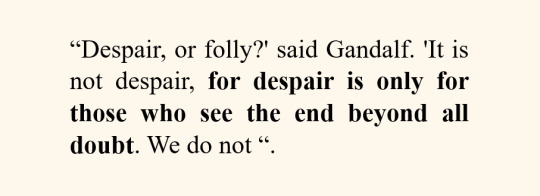
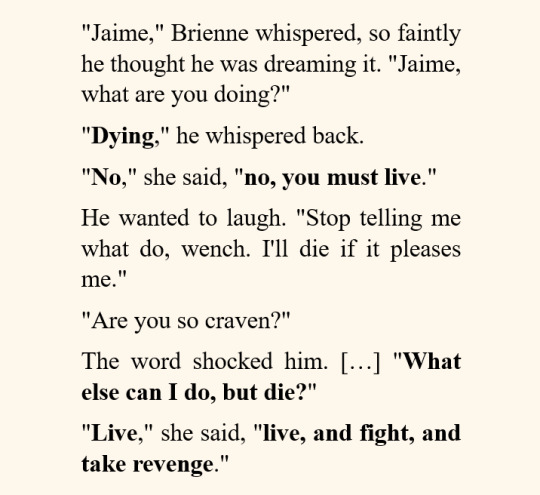

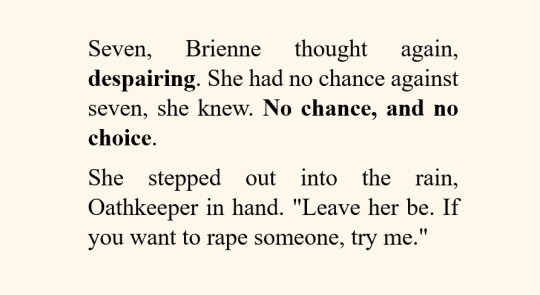
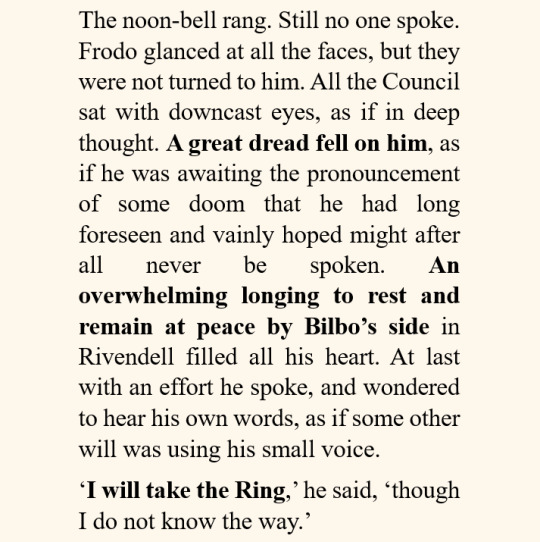
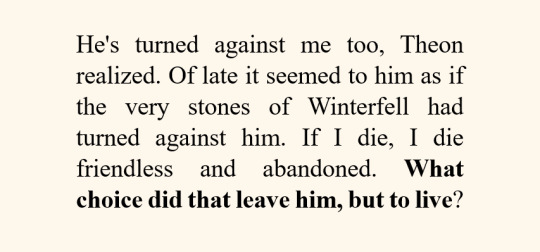

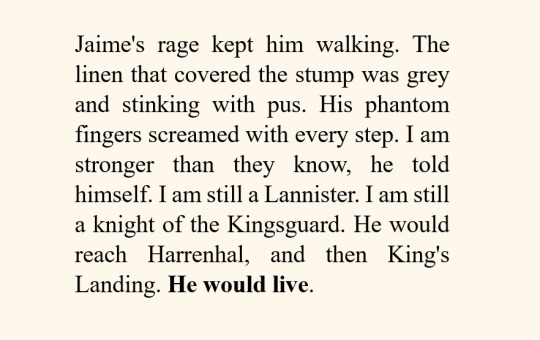
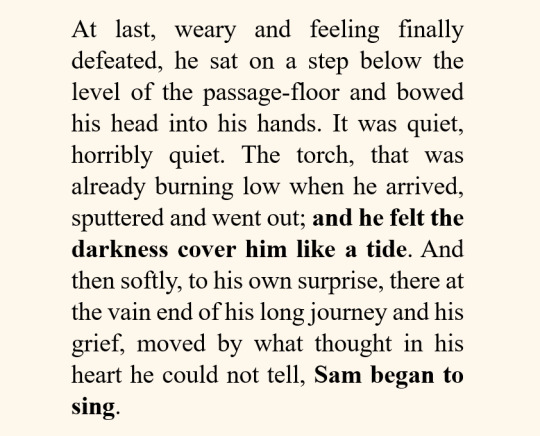
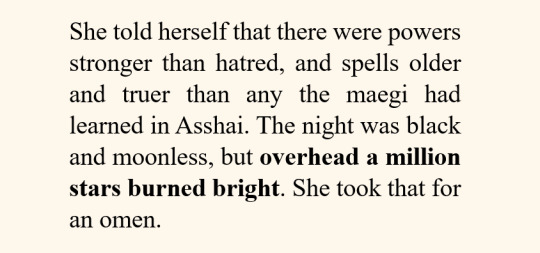
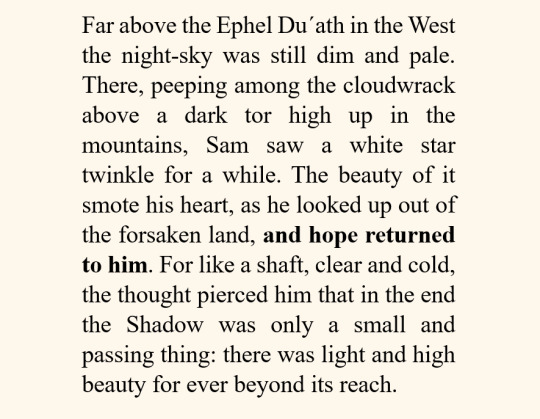
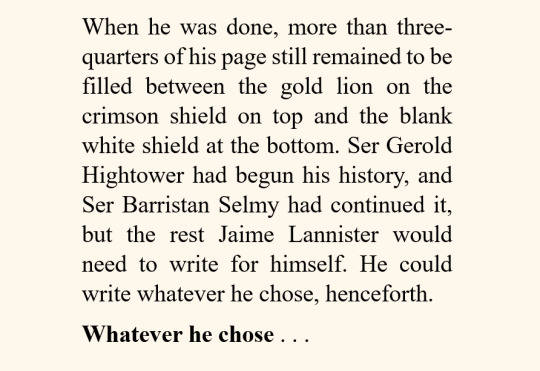



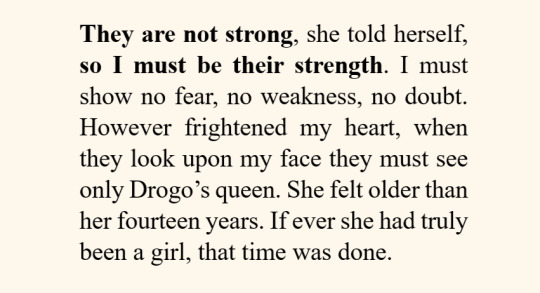
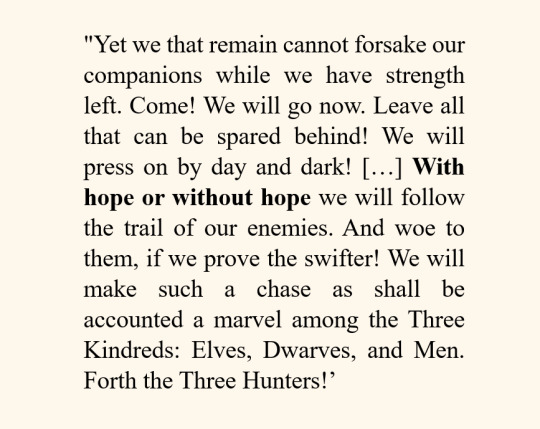
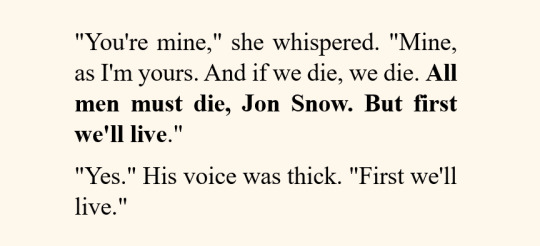

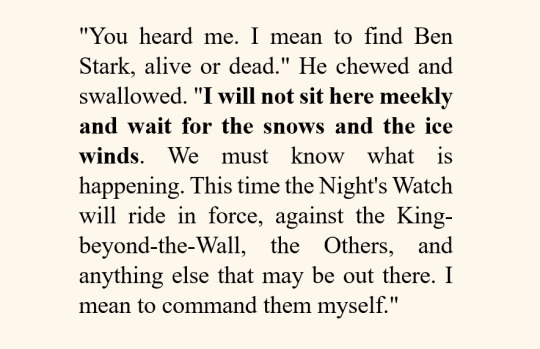

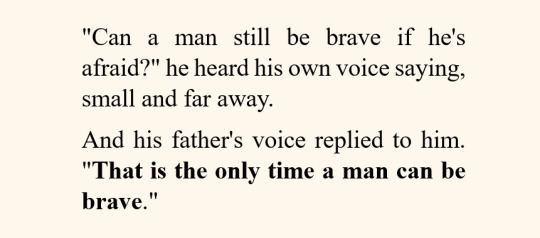


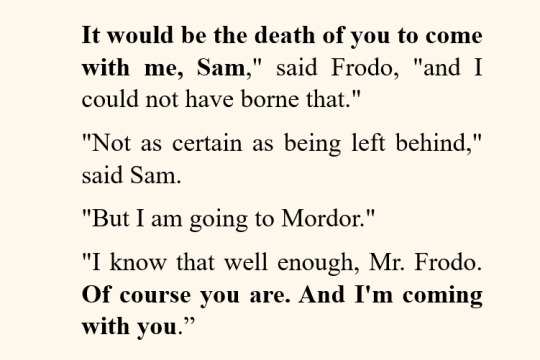
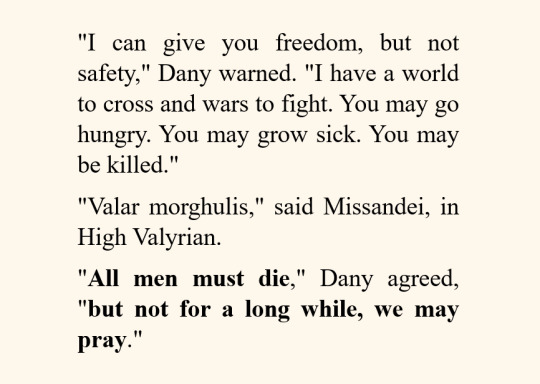
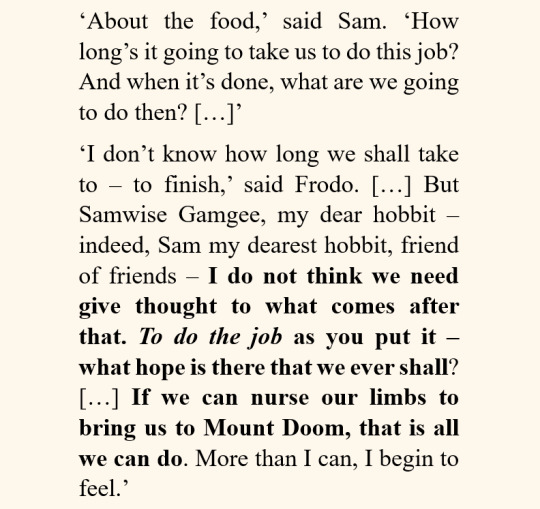
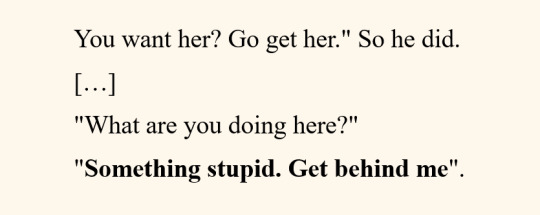

George Martin, 2013: "In a very basic level winter is coming for all of us. I think that’s one of the things that art is concerned with: the awareness of our own mortality. “Valar morghulis” – “All men must die”. That shadow lies over our world and will until medical science gives us all immortality… but I don’t think it makes it necessarily a pessimistic world. Not any more pessimistic than the real world we live in. We’re here for a short time and we should be conscious of our own mortality, but the important thing is that love, compassion and empathy with other human beings is still possible. Laughter is still possible! Even laughter in the face of death… The struggle to make the world a better place… We have things like war, murder and rape… horrible things that still exist, but we don’t have to accept them, we can fight the good fight. The fight to eliminate those things.There is darkness in the world, but I don’t think we necessarily need to give way to despair. One of the great things that Tolkien says in Lord of The Rings is “despair is the ultimate crime”. That’s the ultimate failing of Denethor, the Steward of Gondor, that he despairs of ever being able to defeat Sauron. We should not despair. We should not go gentle into that good night".
JRR Tolkien, 1962 : "One reviewer once said, this is a jolly jolly book, all the right boys come home [...]- this isn't true of course, he can't have read the story. [...] Human stories are practically always about one thing, really, aren't they? Death. The inevitability of death. . . . . . (He quotes Simone de Beauvoir) 'There is no such thing as a natural death. Nothing that ever happens to man is natural, since his presence calls the whole world into question. All men must die, but for every man his death is an accident, and even if he knows it he would sense to it an unjustifiable violation.' Well, you may agree with the words or not, but those are the key spring of The Lord Of The Rings".
"Lotr is all rainbows and unicorns and Asoiaf is nihilistic and grimdark". Wrong, and wrong. In all its hope and radiance, lotr often gets very dark, and despite all the death and suffering, the hopeful moments in asoiaf shine bright. The meeting point of these two is this: having hope while in despair, and even better, refusing to give up because you have to go on despite not having any hope left.
660 notes
·
View notes
Text
Writing Notes: On Children
16 weeks Gets excited, laughs aloud. Smiles spontaneously in response to people. Anticipates eating at sight of food. Sits propped up for 10 to 15 minutes.
28 weeks Smiles and vocalizes to a mirror and pats at mirror image. Many vowel sounds. Sits unsupported for brief period and then leans on hands. Takes solids well. When lying on back, places feet to mouth. Grasps objects and transfers objects from hand to hand. When held standing, supports most of own weight.
12 months Walks with only one hand held. Says “mamma” and “dada” and perhaps two other words. Gives a toy in response to a request or gesture. When being dressed, will cooperate. Plays “peek-a-boo” games.
18 months Has a vocabulary of some 10 words. Walks well, seldom falls, can run stiffly. Looks at pictures in a book. Feeds self, although spills. Can pull a toy or hug a doll. Can seat self in a small or adult chair. Scribbles spontaneously with a crayon or pencil.
24 months Walks up and down stairs alone. Runs well, no falling. Can build a tower of six or seven blocks. Uses personal pronouns (“I” and “you”) and speaks a three-word sentence. Identifies simple pictures by name and calls self by name. Verbalizes needs fairly consistently. May be dry at night. Can pull on a simple garment.
36 months Alternates feet when climbing stairs and jumps from bottom stair. Rides a tricycle. Can copy a circle and imitate a cross with a crayon or pencil. Comprehends and answers questions. Feeds self with little spilling. May know and repeat a few simple rhymes.
48 months Can dry and wash hands, brushes teeth. Laces shoes, dresses and undresses with supervision. Can play cooperatively with other children. Can draw figure of a person with at least two clear body parts.
60 months Knows and names colors, counts to 10. Skips on both feet. Can print a few letters, can draw identifiable pictures.
Source: Gesell, A., & Amatruda, C. S. (1947). Developmental diagnosis: Normal and abnormal child development, clinical methods and pediatric applications (2nd ed. rev.).
266 notes
·
View notes
Text
On Aphorisms
Some observations on the writing of pith.
2 notes
·
View notes
Text
Peerages & Titles: general info
[Full list of disclaimers is in the master post but tl;dr is that sources for this information are not consistent, sources may be modern, and this may be edited/expanded at anytime as my research continues.]
Let’s go! This is the general/summary info I think you should know when writing peerages, and I think is a good starting post before the deep dives. [All can be found in the master post].
All peerage holders are considered peers of the Realm.
Anyone can have multiple and seemingly unlimited peerages [be Viscount of one thing, Earl of another and Duke of another etc] but they will always be addressed as their highest title.
A Baron is never The Baron Featherington, as the higher titles are styled.
The wife of Baron is not [or very rarely, it’s complicated] referred to as Baroness. A Baroness is a woman who holds a Barony in her own right. Portia Featherington is not a Baroness.
Of is used when the peerage of a Marquess or Earl is based on a place, not a family name. For example; if Danbury was a place, then Agatha would be The Countess of Danbury. It is not a place so no of is used.
Duke’s always use of regardless of if it’s based on a place or surname.
Whilst Baron, Viscount and Earl may be based on a place or family name, they are more commonly based on a place/territory [despite most of the Bridgerton examples being based on family names] however the of is not typically used for Barons or Viscounts.
I believe it might be technically possible for a Marquessate or Dukedom to be based on a family name, but I’ve not seen any examples of this and it’s based on a place like 99% of the time if not always.
Some sources say a Marchioness may be called Marquise, however this is the French title, and some sources regarding titles in the UK are very against it.
Dukes and Duchesses are not addressed with their name, hence why it’s not in the table.
All formal letters sent to a peer should be signed Yours faithfully and all social/informal letters should be signed Yours sincerely
First names were rarely used, even by close relations and in intimate settings, until the early–mid 20th century in England. They were often limited to children growing up together and boys/men at school.
Parents may ignore children’s titles when addressing their children, but very often a mother would use one if it was available—such as a son’s courtesy title.
Men could show intimacy through using a close friend's name without the title; for example, just using Bridgerton or Hastings.
Spouses often remained formal, even in private, and would commonly use My Lord/Lady or sometimes pet names such My Dear or My Love. However, this depended on the couple and their intimacy.
Link to the master post with all the forms of address here. Drop any questions in my ask :)
–GW xo
8 notes
·
View notes
Text
So my problem with most ‘get to know your character’ questioneers is that they’re full of questions that just aren’t that important (what color eyes do they have) too hard to answer right away (what is their greatest fear) or are just impossible to answer (what is their favorite movie.) Like no one has one single favorite movie. And even if they do the answer changes.
If I’m doing this exercise, I want 7-10 questions to get the character feeling real in my head. So I thought I’d share the ones that get me (and my students) good results:
What is the character’s go-to drink order? (this one gets into how do they like to be publicly perceived, because there is always some level of theatricality to ordering drinks at a bar/resturant)
What is their grooming routine? (how do they treat themselves in private)
What was their most expensive purchase/where does their disposable income go? (Gets you thinking about socio-economic class, values, and how they spend their leisure time)
Do they have any scars or tattoos? (good way to get into literal backstory)
What was the last time they cried, and under what circumstances? (Good way to get some *emotional* backstory in.)
Are they an oldest, middle, youngest or only child? (This one might be a me thing, because I LOVE writing/reading about family dynamics, but knowing what kinds of things were ‘normal’ for them growing up is important.)
Describe the shoes they’re wearing. (This is a big catch all, gets into money, taste, practicality, level of wear, level of repair, literally what kind of shoes they require to live their life.)
Describe the place where they sleep. (ie what does their safe space look like. How much (or how little) care / decoration / personal touch goes into it.)
What is their favorite holiday? (How do they relate to their culture/outside world. Also fun is least favorite holiday.)
What objects do they always carry around with them? (What do they need for their normal, day-to-day routine? What does ‘normal’ even look like for them.)
51K notes
·
View notes







